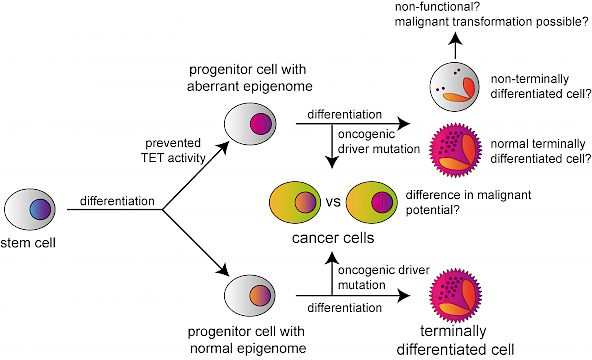 Group of Dr. Traube - Faculty for Chemistry and Pharmacy
Group of Dr. Traube - Faculty for Chemistry and Pharmacy
 Group of Dr. Traube - Faculty for Chemistry and Pharmacy
Group of Dr. Traube - Faculty for Chemistry and Pharmacy
In addition to genetic aberrations, epigenetic changes from a normal epigenome pattern towards a cancer epigenome are essential for tumorigenesis. Epigenetic silencing of tumor suppressor genes and permanent activation of genes that promote proliferation through epigenetic changes are a hallmark of cancer cells. However, to master the switch towards uncontrolled proliferation and malignant transformation, a cell must bypass many intracellular check-points. By selectively interfering with the activity of epigenetic enzymes in an early phase of differentiation, e.g. by gene deletion or enzyme inhibition, we study how these changes affect DNA (hydroxy-)methylation, histone post-translational modifications and chromatin accessibility and how these epigenetic changes accumulate until a malignant tipping-point is reached. We are especially interested in the role of TET enzymes during cancer epigenome development. Many tumors are characterized by low levels of 5-hydroxy-methyl-2'-deoxycytidine. Our aim is to understand how imapired TET activity affects other layers of epigenetic regulation (histone PTMs and chromatin accessibility) and how these changes favor tumorigenesis.
